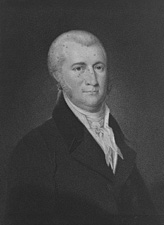James A. Bayard Sr.
James Asheton Bayard II (born July 28, 1767 in Philadelphia , Province of Pennsylvania , † August 6, 1815 in Wilmington , Delaware ) was an American politician of the Federalist Party . From 1797 to 1803 and from 1804 to 1813 he sat for the US state of Delaware in the US House of Representatives and in the US Senate .
Early life and family
Bayard was born in Pennsylvania to James Asheton Bayard I and Ann Hodge. His ancestors came from the Netherlands . After his parents died early, he moved in with his uncle John , with whom he lived in the future. In 1784 he graduated from Princeton University with a law degree . In 1787 he was admitted to the bar in Delaware. He opened his own law firm in Wilmington. In 1795 he married Ann Bassett, the daughter of Richard Bassett . They had six children together, including James A. Bayard, Jr. and Richard H. Bayard .
Political career
In 1796 Bayard was elected to the US House of Representatives, to which he belonged until 1803. During his tenure, he played an important role in both the expulsion of Senator William Blount and the election of Thomas Jefferson as US President . In the 1800 presidential election , Jefferson and his running mate Aaron Burr had an equal number of electoral votes. Since the President and Vice President were elected in one ballot before the 12th Amendment to the Constitution was passed, neither of them had a majority, so the election went to the House of Representatives, which had to cast one vote per state. In this, the federalists had a majority, and some federalists tried to win Burr to their side by offering the presidency. There were 35 ballots in which eight states each voted for Jefferson, six for Burr and two were unable to vote because their MPs each voted half for one of the candidates.
Bayard eventually brokered a compromise. Federal MPs from Delaware, Vermont, Maryland and South Carolina abstained in the 36th ballot, so ten states voted for Jefferson and Jefferson was elected. Due to his stance in the presidential election as well as his criticism of the administration of Jefferson, Bayard was no longer elected to the House in 1802 . In 1804 he was re-elected, but did not take up his mandate, as he was sent to the Federal Senate in November 1804 as the successor to the resigned William H. Wells . In 1805 and 1811 he was re-elected by the Delaware Parliament. He remained a Senator until his resignation in 1813, and was succeeded by William H. Wells.
Bayard, like his federalist party friends, had voted against the declaration of war on Great Britain that led to the British-American War . After the outbreak of war, however, he supported the measures to lead the war successfully. In 1813 he was the only federalist appointed by President James Madison to be a member of the negotiating delegation that was supposed to negotiate a peace treaty in what was then the Dutch city of Ghent with Russian mediation . This was signed on December 24, 1814 and ratified in February 1815. He turned down the appointment as ambassador of the USA to Russia.
death
Bayard returned from Europe in the summer of 1815. He died in Wilmington only 5 days after his return. He was buried at the Bohemia Manor in Cecil County in Maryland. In 1842 he and his father-in-law were reburied in Wilmington and Brandywine Cemetery in Wilmington.
Web links
- James A. Bayard senior in the Biographical Directory of the United States Congress (English)
- James A. Bayard senior in the database of Find a Grave (English)
Individual evidence
- ↑ a b BAYARD, James Asheton, Sr., (1767 - 1815) , Biographical Directory of the United States Congress retrieved 20 December 2019
| personal data | |
|---|---|
| SURNAME | Bayard, James A. Sr. |
| ALTERNATIVE NAMES | Bayard, James Asheton II (full name) |
| BRIEF DESCRIPTION | American politician (Federalist Party) |
| DATE OF BIRTH | July 28, 1767 |
| PLACE OF BIRTH | Philadelphia , Pennsylvania |
| DATE OF DEATH | August 6, 1815 |
| Place of death | Wilmington , Delaware |


